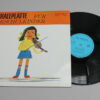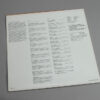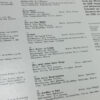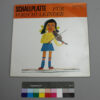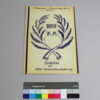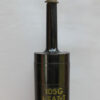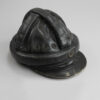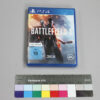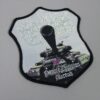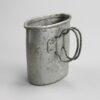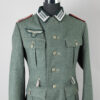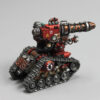Record for pre-school children in the GDR, around 1974-1980
Inventory number: DPM 7.270.1-2
“My brother is a soldier in the big armored car and I can proudly say: My brother protects the state, my brother protects the state / The tank is so heavy, how thick are its walls, and yet it drives swiftly across the terrain, swiftly across the terrain / And if someone attacks us, he has nothing to laugh about, the people’s soldiers watch and stand their ground, and stand their ground.”
This song can be found on a record for pre-school children in the GDR, which was released at the end of the 1970s. The content was developed by the Academy of Pedagogical Sciences of the GDR and approved by the Ministry of National Education as teaching material under the Schola label. The GDR’s education system provided for military content for pedagogical education from pre-school onwards. A positive image of the soldiers of the NVA and the Soviet Army was to be conveyed in kindergarten, which was to be achieved through games and military toys as well as visits from soldiers. NVA Day was to be celebrated with the older children in the nursery. In addition to equipping the facilities with military toys and books, soldiers were also painted in art lessons and military field games and songs were practised.
However, the aim was not only to listen to music, but also to solve listening tasks, such as recognizing the instruments. According to the blurb on the record, these were intended to allow the children to “delve deeper into the content of the piece in question”. The content of the songs was “taken from the children’s environment”, which in the GDR was also a military environment. The song “Mein Bruder ist Soldat” was written by the author of numerous children’s songs and children’s books Manfred Hinrich and was reworked by the influential composer Kurt Schwaen.
The cheerful song in the first-person perspective combines positive feelings such as sibling love and pride with the NVA, tanks and the military defense of the state against unnamed aggressors. Sung by a delicate girl’s voice from the Berlin children’s choir and accompanied by a restrained muted trumpet, accordion and piano, the piece glorifies and trivializes service as a tank soldier.
This early childhood education policy reached the majority of children in the GDR. In 1986, almost 80% of children between the ages of one and three received nursery care. This enabled the SED leadership to gain access to the socialist education of children as early as possible, but also to mothers as an urgently needed workforce: women gladly accepted the offer of free childcare and also gained greater financial independence through the opportunity to work. In 1965, the SED passed the law for a uniform socialist education system. The curricula and daily routines were prescribed for the almost exclusively female educators. As a rule, state institutions implemented the education plan more precisely, while church kindergarten providers were the only ones to have a certain degree of autonomy in terms of content. However, the extent to which the military content desired by the state leadership was implemented varied and also depended on the individual educators. For example, this record for pre-school children contains only two of the 26 songs with military titles, while other records in the series have no military titles at all.
Object of the month
(short) stories from the depot
Unfortunately, many objects cannot currently be shown in the exhibition for conservation reasons. Here you will find unusual objects and exciting stories of special pieces from the depot


